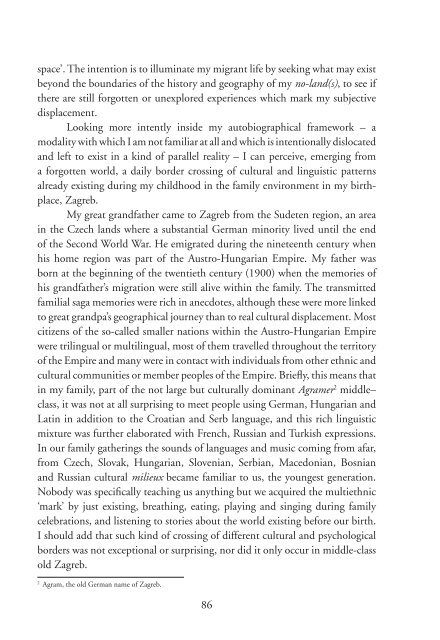Teaching Subjectivity. Travelling Selves for Feminist ... - MailChimp
Teaching Subjectivity. Travelling Selves for Feminist ... - MailChimp
Teaching Subjectivity. Travelling Selves for Feminist ... - MailChimp
Create successful ePaper yourself
Turn your PDF publications into a flip-book with our unique Google optimized e-Paper software.
space’. The intention is to illuminate my migrant life by seeking what may exist<br />
beyond the boundaries of the history and geography of my no-land(s), to see if<br />
there are still <strong>for</strong>gotten or unexplored experiences which mark my subjective<br />
displacement.<br />
Looking more intently inside my autobiographical framework – a<br />
modality with which I am not familiar at all and which is intentionally dislocated<br />
and left to exist in a kind of parallel reality – I can perceive, emerging from<br />
a <strong>for</strong>gotten world, a daily border crossing of cultural and linguistic patterns<br />
already existing during my childhood in the family environment in my birthplace,<br />
Zagreb.<br />
My great grandfather came to Zagreb from the Sudeten region, an area<br />
in the Czech lands where a substantial German minority lived until the end<br />
of the Second World War. He emigrated during the nineteenth century when<br />
his home region was part of the Austro-Hungarian Empire. My father was<br />
born at the beginning of the twentieth century (1900) when the memories of<br />
his grandfather’s migration were still alive within the family. The transmitted<br />
familial saga memories were rich in anecdotes, although these were more linked<br />
to great grandpa’s geographical journey than to real cultural displacement. Most<br />
citizens of the so-called smaller nations within the Austro-Hungarian Empire<br />
were trilingual or multilingual, most of them travelled throughout the territory<br />
of the Empire and many were in contact with individuals from other ethnic and<br />
cultural communities or member peoples of the Empire. Briefly, this means that<br />
in my family, part of the not large but culturally dominant Agramer 2 middle–<br />
class, it was not at all surprising to meet people using German, Hungarian and<br />
Latin in addition to the Croatian and Serb language, and this rich linguistic<br />
mixture was further elaborated with French, Russian and Turkish expressions.<br />
In our family gatherings the sounds of languages and music coming from afar,<br />
from Czech, Slovak, Hungarian, Slovenian, Serbian, Macedonian, Bosnian<br />
and Russian cultural milieux became familiar to us, the youngest generation.<br />
Nobody was specifically teaching us anything but we acquired the multiethnic<br />
‘mark’ by just existing, breathing, eating, playing and singing during family<br />
celebrations, and listening to stories about the world existing be<strong>for</strong>e our birth.<br />
I should add that such kind of crossing of different cultural and psychological<br />
borders was not exceptional or surprising, nor did it only occur in middle-class<br />
old Zagreb.<br />
2<br />
Agram, the old German name of Zagreb.<br />
86

















